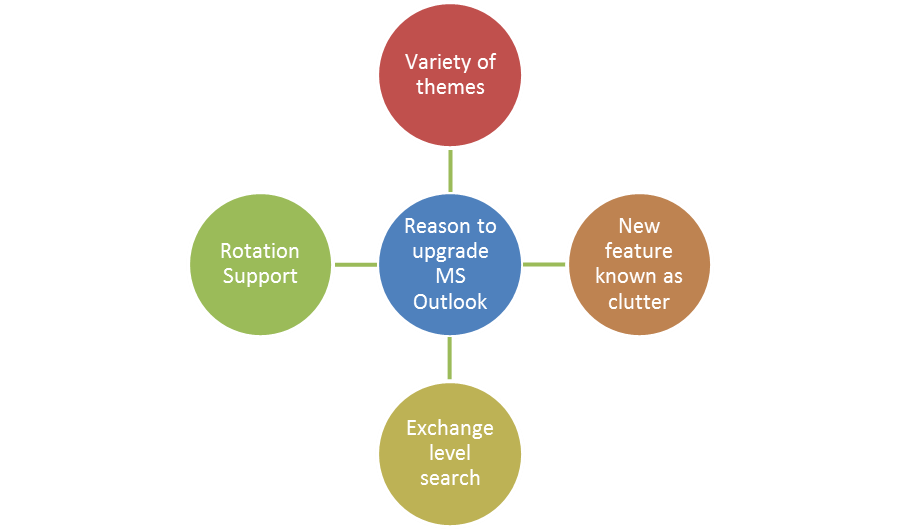
Manage contacts and make notes

Schedule your meetings

Manage different accounts on MS Outlook

Understand about Clutter which will help to manage inbox
As we know in this modern era Email has become one of the most frequently used methods of communication, whether it is used for personal, business or Professionally communications. It doesn’t matter whether you are working in a large or small organisation, email is the most preferred form of communication among the employees.
Nowadays many organisation has decided to implement corporate mail management system for, e.g., Outlook to communicate and organise meetings. It will also help to share your calendar and contacts with others.
Microsoft Outlook training is planned for delegates who have very less knowledge of the Microsoft Outlook 2016 users who want to learn the concepts covered in this course in the 2016 interface. Microsoft has added a new feature in the Outlook known as Clutter it moves emails that users ignored to Clutter to keep the Inbox clean.
Delegates will use Outlook to manage your email communications, including write, manage contact information; read, and respond to emails; schedule appointments and meetings; schedule tasks and create notes; customise message response options, and organise your mail. MS Outlook 2016 also provides different fonts for Arabic as well as Western European languages. This course will provide delegates with the knowledge and skills necessary to be a proficient user.

What is Microsoft Outlook Training?
Microsoft Outlook 2016 provides better organisation, social networking features, search capabilities, and communication. With this Microsoft Outlook 2016 training course, you will learn the four major components of Outlook including contacts, email, calendars and tasks that make things easy for users.
Why Should I take Microsoft Outlook Training?
This Outlook training is suitable for those delegates who want to upgrade their knowledge related to MS Outlook 2016, so they can compose and send, manage personal tasks, scheduling of meetings, and make notes.
Delegates will learn to customise a different set of command, manage different mail accounts, make rules to automate the variety of tasks, set different global options, attach files, check spelling. Apply filters to intercept mail and control spam, manage tasks, handle calendars and contacts, and archive data to protect it.
What are the benefits of Taking Microsoft Outlook Training?
Delegates will learn tasks such as:
Why choose Pentagon Training?
Pentagon Training is known as the best training Provider in all domains.Our instructors are certified and experienced so that delegates will not get difficulty during the course. Pentagon training is one of the most leading training providers of this training due to its high-quality content. It is most trusted by professionals and industry leading brands. Our well trained and experienced instructors teach that what is required by industry.
Enquire Now
----- OR -------
Reach us at +44 1344 961530 or info@pentagonit.co.uk for more information.
Plymouth
Plymouth is a city located on the south coast of Devon, England. Plymouth is 37 miles south-west of Exeter and 190 miles west south- west of London between river Plym and Tamar's mouths.
Throughout Industrial Revolution, Plymouth grew as commercial shipping port handling imports and passengers from America. Plymouth port also export local minerals like copper, lime, china, clay, tin and arsenic. Neighbouring town Devonport became Royal Naval Shipbuilding and dockyard town. In 1928 Plymouth achieved city status. In mid-2015, the city is home to 262,700 which makes it 30th most populous area in the United Kingdom. Plymouth is the second largest in Southwest after Bristol. Plymouth City Council governs Plymouth, and it is represented by three MP’s. The economy of Plymouth is influenced by seafaring and shipbuilding including ferry links to Spain and Brittany. In Western Europe large operational naval base HMNB Devonport is located. Plymouth is home to Plymouth University.
History
Plymouth had a population of 107,000 in the year 1901. In 1914 the two towns Devonport and Stonehouse were merged with Plymouth. Slum clearance started in Plymouth after World War 1. Slum housing was stopped and replaced by council housing in Swilly and New Prospect. By 1928, new 802 houses were built. In 1920 motor buses started in Plymouth and then got replaced by trams. Due to dockyard in Second World War Plymouth was a prime target for bombing. Around 3754 houses were damaged, and more than 8000 were severely damaged. Later slums were replaced with better flats and houses. Later in the 20th century, various houses were built at South way and Egg Buckland. In Plympton and Plymstock many private houses have been constructed. In the 21st century, Plymouth is flourishing. Drakes Circus shopping was remade in 2006, and now the population of Plymouth is 240,000.
Education
The University of Plymouth has enrolled around 23,155 students as of 2015 and 2016. It has 3000 staff and income of around £160 million. Main courses in it include business, marine biology, marine engineering, shipping and much more. The University of St Mark and St John was also known as Marjon or Marjons have expertise in teacher training. These universities offer various training courses across the country as well as abroad. This city is also home to two other large colleges. City College of Plymouth provides courses from basic to foundation degree for various students. Plymouth College of Art offers courses on media. It is only one of the four independent colleges of art and design in the UK.
There are 71 state primary phase schools in Plymouth and 13 state secondary schools. Plymouth has eight special schools, three selective state grammar schools and independent school.
This city is also home to Royal Naval Engineering College that was opened in 1880 in Keyham. It was renamed Dockyard Technical College in 1959. Later training was shifted to the University of Southampton. Marine Biological Association of UK is also located in Plymouth.
We are offering more than 250 courses at 91 locations in UK.